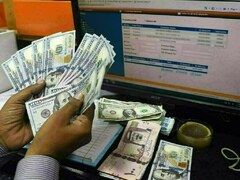This is the second of a two-part series on de-dollarisation. President Richard Nixon’s treasury secretary John Connally sent shock waves around the world in 1971 when he told a group of European finance ministers in no uncertain terms: the dollar is our currency but it’s your problem.
In previous decades US sanctions, supported by the Europeans, negatively impacted on the economies of sanctioned countries.
However, the passage of the Rebuilding Economic Prosperity and Opportunity for Ukrainians ACT (REPO) by Congress on 25 April 2024 and the signing into law by President Biden the next day, allowing him to confiscate Russian sovereign assets subject to US jurisdiction to support Ukraine’s war effort, may have strengthened the momentum towards de-dollarization.
As the bulk of the 300 billion-dollars Russian sovereign assets are held in Europe the Biden administration was forced to seek European concurrence.
After numerous deliberations the Europeans announced that while the assets would remain frozen (effective February 2022) the interest on these assets may be used to extend a 50 billion-dollar loan to Ukraine for its war with Russia, an agreement not yet implemented as European sanctions law allows for an extension every six months.
Besides, Ukrainian economists argue that this loan would raise the country’s debt to unsustainably high levels, higher than the Greek debt crisis in 2009 which led to a massive European and IMF bail-out the next year.
Initially, US sanctions against Russia led to a fall in the rouble and Putin sought payment in rouble from gas/energy sales to Europe, in violation of their contracts, with the objective of propping up the rouble.
On refusal by the Europeans, Putin cut energy sales with some serious negative consequences on European output in general, and Germany’s car industry in particular evidenced from Volkswagen’s recent announcement that it is considering closing its plant, the first time in its 87-year history, as it is no longer able to compete with Chinese electronic vehicles as German energy costs have become too high.
More recently, on 4 July 2024 during a meeting of the Shanghai Cooperation Organisation (SCO) Putin stated that “SCO member states are settling their bilateral trade in their own currencies. Their share in Russia’s commercial transactions with the members of the organisation has already exceeded 92 percent in the first four months of 2024. We are convinced that along with BRICS (Brazil, Russia, India, China and South Africa), the SCO is a pillar of the emerging world order. These two organisations serve as a powerful driving force behind global development processes and efforts to ensure true multipolarity.”
There are more than 40 pending applications for BRICS membership, a number that is rising. The Association recently received an application for membership from a NATO country, Turkey, which has sent shock waves in the West. Turkey it may be added has been granted NATO membership but unlike Hungary, Poland, the three Baltic States, it has not yet been granted EU membership.
De-dollarisation has therefore gathered momentum due to two major factors. One, the existing US economic travails and two the US sanction regime as part of its foreign policy. Joseph Moss writing for the International Banker sums it up, “Whether it is the imposition of sanctions that obstruct a country’s access to dollars on international markets, the freezing of a country’s dollar-denominated assets held within Western apex financial institutions or the banning of a country’s banks from the dollar-denominated SWIFT (Society for Worldwide Interbank Financial Telecommunications) payment system, the keenness to de-dollarise has gathered pace this year as more countries seek to diversify their exposures into alternative currencies and investments.”
So where does Pakistan stand in this drive? Pakistan is not a BRICS member, though the original five members have accepted full membership of another five countries: Egypt, Ethiopia, Iran, Saudi Arabia and the United Arab Emirates. Or, in other words, three of the ten countries labelled as friendly countries are members of BRICS but given that neither of the three has shown any willingness to extend any assistance, pledged or additional, to Pakistan unless we are on a strictly monitored Fund programme as evident since 2019, shows that the first priority for the country must be to get out of the deep economic impasse it has been struggling against.
In November last year Pakistan formally applied for BRICS membership with another 29 countries, though it is considered likely that India would play the role of a spoiler.
There is also no doubt that Pakistan’s existing debt profile and sustained heavy reliance on external borrowing is in dollar terms (to pay interest and principle as and when due and to meet its budgeted current expenditure) which makes the prospect of a move towards de-dollarization premature at this stage.
In addition, borrowing at very high rates with a small amortization period from the commercial banking sector abroad - 4 billion dollars reportedly borrowed or pledged in the current fiscal year - is likely to be in dollars even though the source are two UAE banks, a BRICS member country.
So far, it is unclear whether the Pakistani move to enter the Chinese panda bond market - up to 500 million dollars as announced by the incumbent finance minister Muhammad Aurangzeb soon after he took oath of office - have borne any fruit. On 12 June 2024 however, Aurangzeb stated that Pakistan will launch panda bonds in the Chinese market following the approval of the IMF loan.
March 2024 as per the Economic Survey 2023-24 Pakistan’s debt was as follows: multilateral debt was 38.4 billion dollars, bilateral procured largely in dollars with the three friendly countries, including from China, disbursing 18.9 billion dollars, Paris Club 7.2 billion dollars Euro/Sukuk global bonds 7.8 billion dollars and commercial loans/credit 5.57 billion dollars.
The net desired inflows (exports plus remittances minus imports) are not sufficient to meet the debt repayments and in 2023 exports were 28.93 billion dollars, remittances at 26.35 billion dollars minus imports of 48.35 billion dollars with positive 6.939 billion dollars – not enough to meet the debt repayments.
In the previous year the desired inflows (exports were 31.5 billion dollars plus remittances of 29.88 billion dollars were together less than imports of 65.88 billion dollars by 4.5 billion dollars), more usual occurrence as and when imports were not curtailed with the objective of fuelling growth, implying thereby that borrowing was required to meet the trade gap as well.
To conclude, Pakistan’s heavy dependence on loans from multilaterals led by the US-led West as well as the Paris Club makes any attempt towards de-dollarisation not a viable option at this stage and leaves us very susceptible to US sanctions as well as the reluctance of friendly countries to extend any assistance without being on a Western controlled IMF programme.
Copyright Business Recorder, 2024























Comments
Comments are closed.